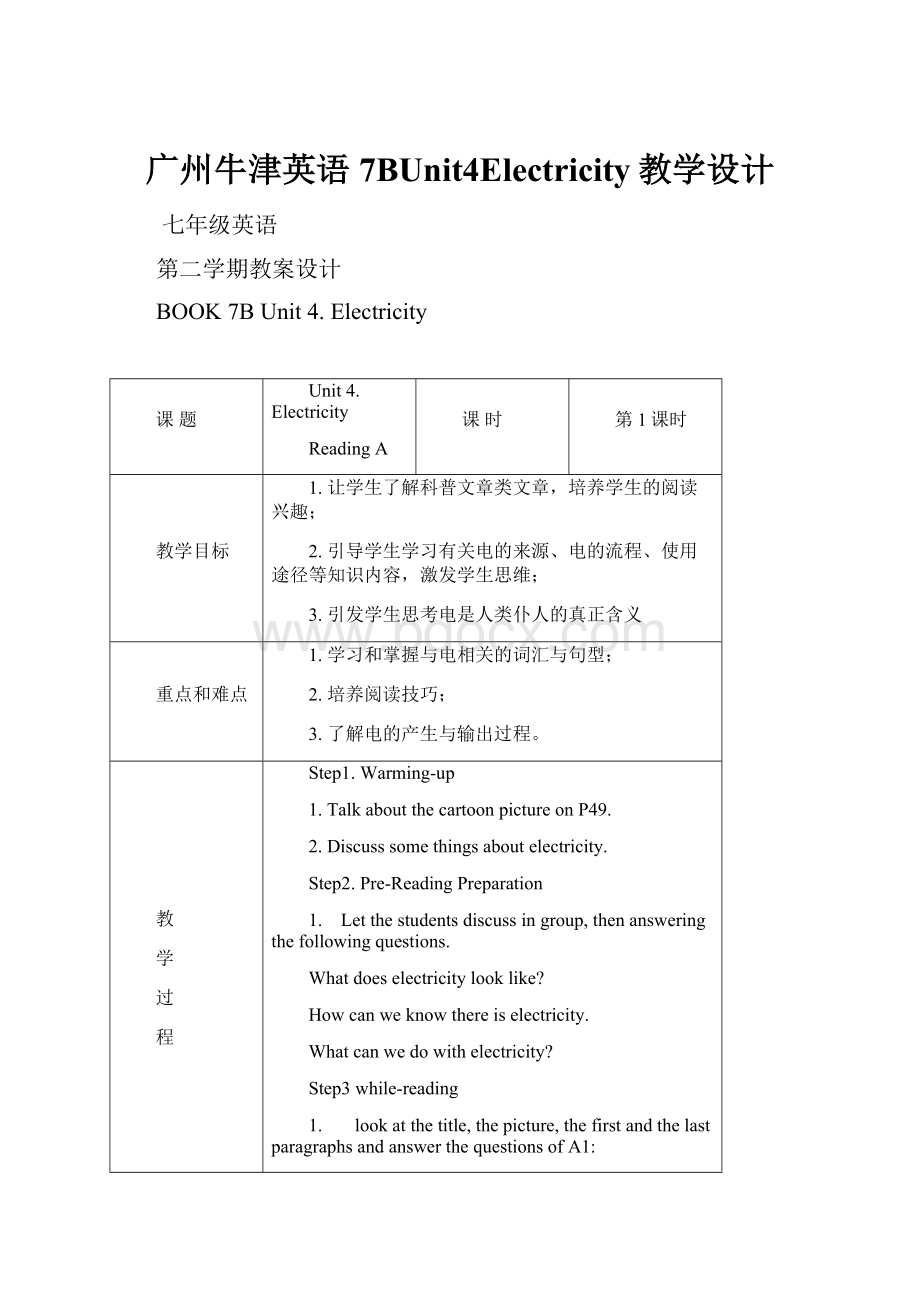广州牛津英语7BUnit4Electricity教学设计.docx
《广州牛津英语7BUnit4Electricity教学设计.docx》由会员分享,可在线阅读,更多相关《广州牛津英语7BUnit4Electricity教学设计.docx(13页珍藏版)》请在冰豆网上搜索。

广州牛津英语7BUnit4Electricity教学设计
七年级英语
第二学期教案设计
BOOK7BUnit4.Electricity
课题
Unit4.Electricity
ReadingA
课时
第1课时
教学目标
1.让学生了解科普文章类文章,培养学生的阅读兴趣;
2.引导学生学习有关电的来源、电的流程、使用途径等知识内容,激发学生思维;
3.引发学生思考电是人类仆人的真正含义
重点和难点
1.学习和掌握与电相关的词汇与句型;
2.培养阅读技巧;
3.了解电的产生与输出过程。
教
学
过
程
Step1.Warming-up
1.TalkaboutthecartoonpictureonP49.
2.Discusssomethingsaboutelectricity.
Step2.Pre-ReadingPreparation
1. Letthestudentsdiscussingroup,thenansweringthefollowingquestions.
Whatdoeselectricitylooklike?
Howcanweknowthereiselectricity.
Whatcanwedowithelectricity?
Step3while-reading
1. lookatthetitle,thepicture,thefirstandthelastparagraphsandanswerthequestionsofA1:
whatisthegirlgoingtobuy?
Whatdidtheboyaskhertodo?
Whoorwhatistheservantinthetitle?
2. Checktheanswerafterthefirstreading,andaskthestudentwhichlinescanfindtheanswers.
3. Readthestoryforthesecondtimeandanswerthefollowingquestions:
DidBennyoftentrytofoolDaisy?
Canweseeelectricity?
DidBennyfoolDaisysuccessfully?
HowdidBennyexplainaboutelectricity?
4. ReadthetextforthesecondtimeandfinishA3andA4.
5.Checktheanswers,thendiscussinghowdoeselectricitymakethelightbulbshine.
6.Readafterthetapeandtranslatethewholepassage.
Step4.Post-Reading
1. Languagepoints
2. Haveadebate:
electricityisagoodservantorabadservant?
3.FindthetruemeaningofAservantofmankind.
Homework:
1.Writedowntheimportantphrasesandsentences.
2.FinishtheexercisesonBookBandEnglishWeekly.
教学反思
课题
Unit4.Electricity
ReadingA
课时
第2课时
教学目标
1.熟悉课文内容并流利朗读
2.熟悉课文短语并运用。
理解课文相关语法知识并运用。
重点和难点
理解课文相关语法知识并运用情态动词can,may的基本运用。
教
学
过
程
1.Revision
Dictation1.apacketofeletricity2.foolDaisy3.aservantofmankind4.inaway5.abadexplanation6.differentformsofenergy7.MayIhavemypacketofelectricity?
8.Thecablesareconnectedtoapowerstation.
Checkthehomework.
2.Readaloud
a.ReadthepassageandmakesuretheSscanreaditfluently.
b.HelptheSstoretellthepassage.
3.Learning
a.Dealwithsomeusefulphrasesandexpressionsinthepassage.GuidetheSstolearnandusethem.
1.apacketof2,fool
3.inaway.4.shakeone’shead.
5.change…into.6.beconnectedto
b.Learnthemodalverbscanandmay.HelptheSspractisethem.
4.Homework
Finishtheexercisesin第三版ReadingA
教学反思
课题
Unit4.Electricity
ReadingB
课时
第3课时
教学目标
4.了解学习电在日常生活中的应用及用电安全;
5.激发学生获取知识的兴趣,培养阅读技巧;
6.指导学生学会运用文中的祈使句与情态动词。
重点和难点
1.熟悉并掌握相关电器的专有名词及重要句型的表达与运用。
2.了解电的不同表现形式的分类,与有关用电的常识。
教
学
过
程
Step1.Warming-up
Groupwork---Vocabularycompetition.
Step2.Pre-ReadingPreparation
1. Canelectricitychangeintodifferentformsofenergy?
2. Howmanykindsofenergydoyouknowinourdailylife?
Step3while-reading
1. DotheexerciseB1andaskthestudentsanswerwhataretheitemsinthepictures.
2. Doyouknowhowtousetheseelectricalappliances?
3. Let’sreadthearticle,finishtheexercisesonB2andchecktheanswers.
4.Skimthisarticleandanswerthequestion:
Howmanykindsofthingsdoesthearticletalkabout?
Whatarethey?
Step4.Post-Reading.
1.Togetstudentstoknowthewaysoflookingforinformation.
2.Findtheseusefulphrasesandexpressions:
1).热能heatenergy
2).日常生活dailylife
3).简单实惠simpleandcheap
4).使…处于工作状态leave…on
5).使…从…中解脱出来free…from
6).对…小心becarefulof
7).为了安全起见onthesafeside
8).确保makesure
9).保持…干燥keep…dry
10).引起火灾startafire
Homework:
3.Chooseoneoftheelectricalmachines.Writeabouthowwecanuseitorwhatwemustnoticewhenweuseit.
4.DotheexerciseinBookB:
Reading.
教学反思
课题
Unit4.Electricity
Listening
课时
第4课时
教学目标
1.通过读图以及关键词,预测对话主题;
2.指导学生记录重要的信息笔记。
重点和难点
学会判断听力材料的主题句,快速了解材料主要内容的方法。
教
学
过
程
Step1.Warming-up
1.Showthepicturesandkeywordsoftheelectricalappliances.
2.Letthestudentstellsomethingabouttheseelectrical
appliances.
Step2.Pre-Listening
1.Getthestudentsreadthenotes,andtellwhatthislisteningwillbeabout.
2.Askthestudentspayspecialattentiontothebeginningofadialogue,andtrytofindthetopicofthedialogueinthefirstseveralsentences.
Step3.while-reading
1.Askthestudentslistencarefullytomatchthekeywordstotheinformationinthedialogue.
2.Playthetapeforthefirsttimewithoutstopping.
3.Checktheanswersorally.
4.Playtherecordagainforthestudentstotheanswersforsure.
5.Listentothetape,andfinishB2,remembertotakenotesandcallsomestudentstoanswerthequestions.
Step4.Post-Listening
1. Explainthelisteningskilloftakingimportantnotesagain.
2. Checkthenotestakingofstudents.
课题
Unit4.Electricity
Language
课时
第5课时
教学目标
1.了解情态动词can,may,must的基本用法;
2.掌握情态动词在肯定句、否定句和疑问句中的结构。
重点和难点
1.让学生学会掌握情态动词can,may,must的基本用法;
2.能够用情态动词纠正人们使用电器时的不正确之处;
3.知道can与may的区别,mustnot与neednot的区别。
教
学
过
程
Step1.Warming-up
1.Letthestudentsfindoutthesentenceswhichcontainmodalverbsinthetext,forexample:
1)Canyougetmeapacketofelectricity,please?
2)Youcan’tbuyelectricityinpacketslikesweets!
3)MayIhavemypacketofelectricity?
4)Whenyoulookatapicture,yourbrainholdsthepictureforone-tenthofasecond,thenyoumustlookagain.
Step2.
1.Letthestudentstranslatethefollowingmodalverbs:
1).can能、会、能够
2).cannot=can’t不能
3).can’tbe不可能是
4).may可以
5).maybe也许是
6).maynot可以不
7).must必须
8).mustbe一定是
9).mustnot=mustn’t禁止,不许
10).neednot=needn’t不必要
2.FinishexercisesofA1,BandC,thencheckingtheanswerstogether.
Step3.
6.Explainhowtousethemodalverbs:
can:
a表示能力,中文意思是“__能;会”,相当于_beableto。
b.表示许可,中文意思是“_可以_”,相当于may。
c.表示可能性,can’t中文意思是“_不可能_”。
d.can的否定形式是_can’t__。
过去式_could__的语气比can更加客气委婉,表示语气时并不代表过去时。
may:
a.表示允许,中文意思是“__可以___”相当于_can/could_。
b.表示猜测,暗含的可能性较小,中文意思是“__也许__”。
c.may的否定式为__maynot__.注意may的否定式不能缩写。
且由may构成的一般疑问句的否定回答用__can’t或mustn’t_,而不用maynot。
must:
a.表示义务,中文意思是“__必须___”。
b.mustn’t的中文意思是“__禁止___”。
c.表推测,暗含有很大的可能性,用于肯定句,中文
意思是“__一定是___”。
d.注意:
由must构成的一般疑问句的否定回答要用needn’t_或_don’thavetodo_,而不用mustn’t。
f.must与haveto的区别,must表示主观看法,haveto表示客观需求,中文意思为__不得不__。
Step4.
Homeworkassignment.
教学反思
课题
Unit4.Electricity
Speaking
课时
第6课时
教学目标
1.正确朗读四个双元音,归纳字母组合ear等的发音规律;
2.通过对课本图片的描述,指导学生对话,进一步巩固本单元的话题。
重点和难点
指导学生学会在不同的语境中使用情态动词,加强口语锻炼。
教
学
过
程
Step1.Warming-up
1.Saythewordintheboxes,payattentiontothepronunciationsofthestudents.
2.Makesurethestudentsarepronouncingthecorrectsound.
Step2.
1.HavethestudentspracticetheconversationofA2inpairs.
2.Get2or3pairstoactoutthisdialogueinfrontoftheclass.
Step3.
DotheexerciseofPartB,andletthestudentmakedialoguesinpairwork.
1.S1:
MayIturnonthewaterheater?
S2:
Noyoumaynot,Youmustopenthewindowfirst.
Thenyoumayturnonthewaterheater.
2.S1:
MayIputthemeetinthefridge?
S2:
No.Youmaynot.Youmustcoverthemeatfirst.
Thenyoumayputitinthefridge.
3.S1:
MayIgivethebabyabath?
S2:
No,youmaynot.Youmustlestthewaterfirst.
Thenyoumaygivethebabyabath.
4.S1:
MayIopenthedoor?
S2:
No,youmaynot.Youmustlookthroughthepeepholefirst.Thenyoumayopenthedoor.
5.S1:
MayIgotobed?
S2:
No,youmaynot.Youmustlockthedoorfirst.
Thenyoumaygotobed.
6.S1:
MayIgooutnow?
S2:
No,youmaynot.Youmustputyourtoysawayfirst.Thenyoumaygoout.
教学反思
课题
Unit4.Electricity
Writing
课时
第7课时
教学目标
1.学生已掌握情态动词的意义和用法,要求学生学会把情态动词使用到写作当中,从而帮助学生巩固所学的知识。
2.以节约用电为话题,提高学生节约资源与安全用电的意识。
重点和难点
1.注意情态动词的合理使用,巩固已学知识;
2.学会观察图片,看图写作,激发学生的思维,拓展写作思路。
教
学
过
程
Step1.Warming-up
DotheexerciseofPartAMakingrules,thencheckingtheanwerstogether.
Step2.
1.LookatthepicturesonP62andanswerthefollowingquestions:
1).Howmanylightsdoestheboyturnon?
2).Doesheneedfourlights?
3).Sowhatmustwenotdotosaveelectricity?
4).Whatdidtheownerforget?
5).Sowhatmustwedotosaveelectricity?
6).Whatdidheforget?
7).Sowhatmustwenotdotosaveelectricity?
8).Whatdidtheownerforgetwhenheusedtheairconditioner?
9).Sowhatmustwedotosaveelectricity?
2.根据以上问题回答的内容补充以下文章:
Let’ssaveelectricityinourdailylife!
Electricityisveryimportantandusefulinourdailylife,sowemustmakesomerulestosaveit.First,____________________________________________________________________________________________________________________________________________________________________________________________________________________________Allinall,wedon’tneedtodobigthings,wecanjuststartoutsmall.Let’sdoourbesttosaveelectricityfromnowon!
Step3.
Homeworkassignment.
根据下面提示,写一篇短文。
词数:
80词左右
内容:
1、电在我们的校园生活中是非常有用的。
没有电就会很麻烦,因此我们要节约用电。
2.文中至少有3条合理节约用电的做法。
题目:
Let’ssaveelectricityinourschool!
__________________________________________________________________________________________________________________________________________________________________
______________________________________________________
______________________________________________________
______________________________________________________
______________________________________________________
教学反思
课题
Unit4.Electricity
MorePractice
课时
第8课时
教学目标
1.增加学生的阅读层面,扩展学生的阅读范